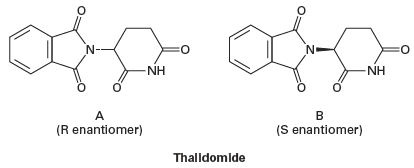


 علم الكيمياء
علم الكيمياء 
 الكيمياء التحليلية
الكيمياء التحليلية 
 الكيمياء الحياتية
الكيمياء الحياتية 
 الكيمياء العضوية
الكيمياء العضوية 
 الكيمياء الفيزيائية
الكيمياء الفيزيائية
 الكيمياء اللاعضوية
الكيمياء اللاعضوية 
 مواضيع اخرى في الكيمياء
مواضيع اخرى في الكيمياء
 الكيمياء الصناعية
الكيمياء الصناعية |
Read More
Date: 29-3-2016
Date: 8-10-2017
Date: 29-3-2016
|
The Chiral Drug Thalidomide
In the late 1950s, thalidomide was a drug marketed to treat morning sickness in pregnant women and also prescribed as a sedative. Shortly thereafter, the drug was found to cause birth defects, namely phocomelia (malformation of the limbs) in infants. Some 10,000 cases of phocomelia had surfaced by the time thalidomide use was halted; about half the afflicted children survived past infancy.
The drug was marketed as a racemic mixture of two isomers (A and B). (R)-Thalidomide (isomer A) has sedative and antiemetic (anti-nausea) effects, whereas the S enantiomer (isomer B) is a teratogen. The enantiomers can interconvert in vivo—that is, if a human is given pure (R)-thalidomide or (S)-thalidomide, both isomers can be found in the serum—therefore, administering only one enantiomer will not prevent the teratogenic effect in humans.
The S isomer was found to insert (intercalate) into subunits of DNA, mainly by attachments to guanine, thus interrupting normal development. The negative impact of this drug on the general public resulted in more rigorous assessment of drugs in development. Now, all regulatory bodies demand an examination of isomeric purity as well as clinical and toxicity testing before approval of a new drug.

The teratogenic mechanism of the S isomer results in an interference with the production of certain proteins necessary for angiogenesis, the process whereby new blood vessels are formed. A lack of blood vessels deprives a growing limb of critical nutrients, resulting in stunted growth. Medicinal chemists have realized that angiogenesis is crucial for the development of malignant tumors and thus have investigated thalidomide as a therapeutic agent against certain cancers. The U.S. Food and Drug Administration (FDA) has now approved thalidomide for use in newly diagnosed cases of multiple myeloma.
The teratogenic mechanism of the S isomer results in an interference with the production of certain proteins necessary for angiogenesis, the process whereby new blood vessels are formed. A lack of blood vessels deprives a growing limb of critical nutrients, resulting in stunted growth. Medicinal chemists have realized that angiogenesis is crucial for the development of malignant tumors and thus have investigated thalidomide as a therapeutic agent against certain cancers. The U.S. Food and Drug Administration (FDA) has now approved thalidomide for use in newly diagnosed cases of multiple myeloma.



|
|
|
|
لخفض ضغط الدم.. دراسة تحدد "تمارين مهمة"
|
|
|
|
|
|
|
طال انتظارها.. ميزة جديدة من "واتساب" تعزز الخصوصية
|
|
|
|
|
|
|
بمناسبة مرور 40 يومًا على رحيله الهيأة العليا لإحياء التراث تعقد ندوة ثقافية لاستذكار العلامة المحقق السيد محمد رضا الجلالي
|
|
|